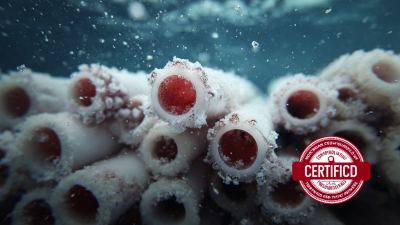Incorporating Frozen Fishballs into your diet can offer a myriad of health benefits that go beyond mere convenience. These delicious and versatile ingredients are not only easy to prepare but also packed with essential nutrients that can enhance your overall well-being. Frozen Fishballs are typically rich in protein, providing a great alternative to meat for those seeking healthier dietary options. They often contain omega-3 fatty acids, which are known to support heart health and reduce inflammation. Additionally, their varied flavors and textures make them suitable for a wide range of culinary applications, from soups to stir-fries, allowing you to experiment with different recipes and cuisines. By embracing Frozen Fishballs in your meals, you not only satisfy your taste buds but also take a proactive step toward maintaining a balanced and health-conscious diet.

Frozen fishballs are a convenient and nutritious food option that offers several health benefits. Made primarily from fish, these delicious morsels are rich in high-quality protein, essential for muscle repair and overall body function. Protein's role in maintaining a healthy metabolism is crucial, particularly for those looking to manage their weight. Additionally, fishballs often contain omega-3 fatty acids, which are known for their heart-healthy effects. Consuming omega-3s can help lower cholesterol levels, reduce inflammation, and promote heart health.
Furthermore, frozen fishballs are typically low in carbohydrates, making them suitable for various dietary preferences, including low-carb or ketogenic diets. They can also be a great source of important vitamins and minerals. Fish is rich in vitamin D, which supports bone health and immune function, and minerals like iodine and selenium, essential for thyroid health and antioxidant activity. By incorporating frozen fishballs into meals, individuals can enhance their nutritional intake while enjoying a versatile ingredient that fits into various cuisines.

Including frozen fishballs in your diet can provide a convenient and nutritious source of protein. According to the Food and Agriculture Organization (FAO), fish is recognized as a top protein source, delivering essential amino acids while being low in saturated fat. Frozen fishballs offer a practical way to incorporate fish into meals, as they are easy to prepare and can be added to various dishes. A serving of fishballs can contain about 15-20 grams of protein, contributing significantly to the recommended daily intake, which varies based on age and activity level but generally ranges from 46 grams for women to 56 grams for men.
Moreover, the inclusion of fishballs in your diet helps diversify your protein sources. The World Health Organization (WHO) emphasizes the importance of balanced nutrition, and incorporating seafood can be a vital component in achieving this. Studies have shown that diets rich in fish are associated with various health benefits, including heart health and improved cognitive function. By integrating frozen fishballs, you can easily meet your protein requirements while enjoying the added benefits of omega-3 fatty acids, which are known to promote cardiovascular health and reduce the risk of chronic diseases.
| Nutrient | Amount per 100g | % Daily Value |
|---|---|---|
| Protein | 15g | 30% |
| Fat | 5g | 7% |
| Carbohydrates | 10g | 4% |
| Sodium | 400mg | 17% |
| Omega-3 Fatty Acids | 1000mg | - |
| Iron | 1.5mg | 8% |
| Calcium | 50mg | 5% |
Frozen fishballs are not only a convenient addition to meals, but they also provide significant health benefits, particularly due to their rich omega-3 fatty acid content. Omega-3s are essential fats that play a crucial role in maintaining heart health by reducing inflammation and lowering blood pressure. These fatty acids can also help in reducing triglycerides, which is vital for preventing heart disease. Incorporating frozen fishballs into your diet is an easy way to increase your omega-3 intake, ensuring your heart remains healthy while savoring a delicious meal.
Tips for including frozen fishballs in your diet include adding them to soups or stir-fry dishes, where they can absorb flavors and enhance overall taste without needing lengthy preparation. Alternatively, you can bake or steam them for a healthier option, maintaining their nutritional value while avoiding excess oil. Pairing fishballs with fresh vegetables not only boosts the nutritional profile of your meal but also adds fiber and essential vitamins, creating a balanced diet that supports cardiovascular health.
This chart shows the content of Omega-3 fatty acids in various fish products, including frozen fishballs, highlighting the health benefits associated with their consumption.
Frozen fishballs offer a remarkable convenience factor for those looking to prepare quick meals without compromising on nutrition. These pre-cooked products can be ready in just minutes, making them an ideal choice for busy individuals or families. Simply boiling or pan-frying frozen fishballs can transform them into a delicious meal or snack in no time, allowing for more time to focus on other aspects of cooking or family activities.
Additionally, the versatility of frozen fishballs enhances their appeal in meal preparation. They can be incorporated into various dishes, such as soups, stir-fries, or served with dipping sauces. By simply adding them to existing recipes, you can elevate your meals with minimal effort. This not only aids in saving time but also encourages creativity in the kitchen, enabling you to experiment with different flavors and ingredients while ensuring that a nutritious option is always at hand.
When considering the cost-effectiveness of frozen fishballs against fresh seafood options, several factors come into play. According to a report from the National Fisheries Institute, seafood prices have seen an upward trend, with fresh fish often costing up to 30% more than their frozen counterparts. This is primarily due to higher transportation costs and seasonal availability, making frozen fishballs a budget-friendly alternative for households looking to incorporate fish into their diet without breaking the bank.
Moreover, a study published by The SeafoodSource shows that the average price per pound for frozen fishballs hovers around $4, significantly lower than that of fresh fish, which can reach upwards of $10 depending on the variety. This makes frozen fishballs not only more economical but also a versatile ingredient for various dishes. Their long shelf life means they can be stored conveniently, eliminating the need for frequent trips to the market. Overall, choosing frozen fishballs can enhance dietary options while also being easier on the wallet, allowing families to enjoy the nutritional benefits of seafood without the associated costs.







